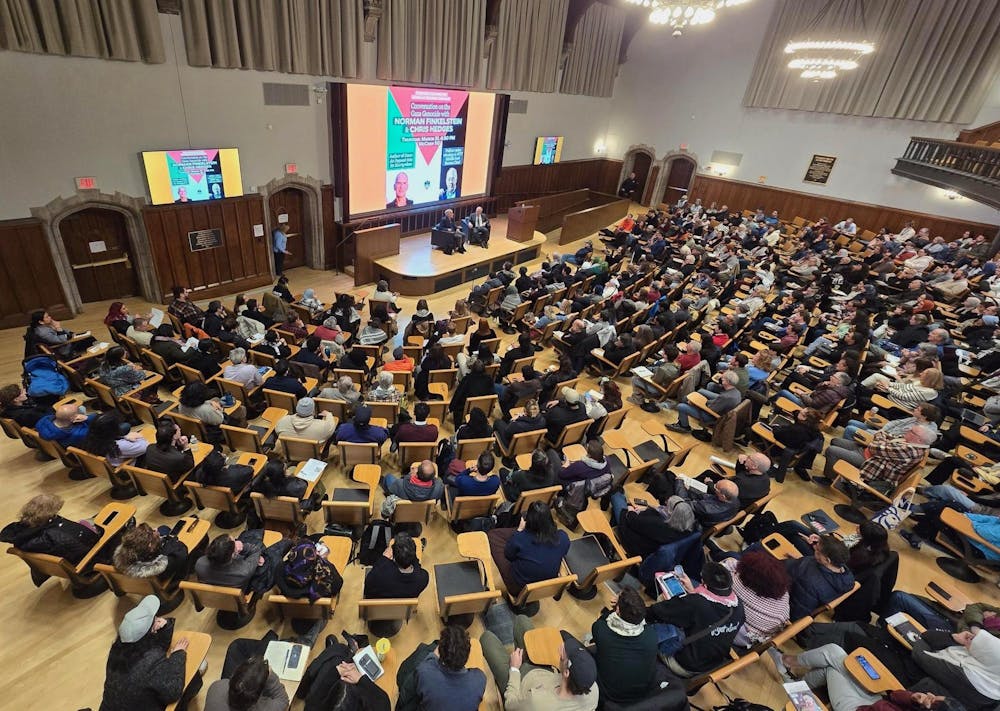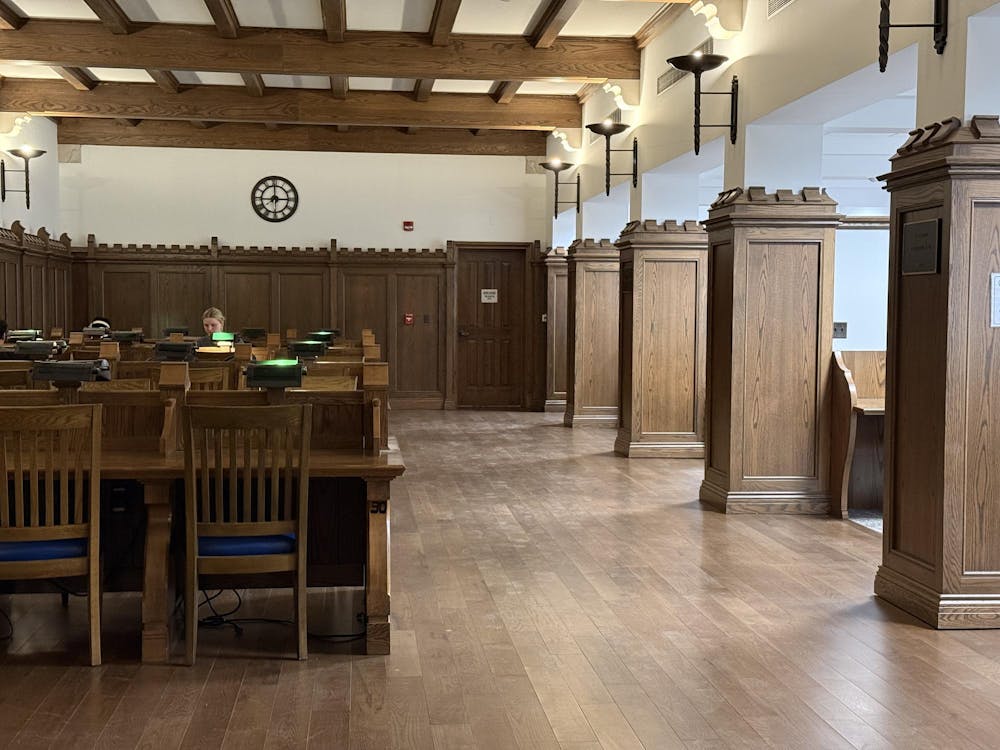A talk with author Norman Finkelstein GS ’87 titled “On the Gaza Genocide,” moderated by journalist Chris Hedges, drew approximately 300 students, faculty, and community members to McCosh 50 on Thursday, March 21.
Finkelstein received his Ph.D. from Princeton in 1987, writing a dissertation on Zionist theory. His critical views of Israel have attracted controversy over the years, including in 2007, when he was denied tenure at DePaul University. Finkelstein is the son of Holocaust survivors. Hedges was a foreign correspondent for The New York Times in the Middle East and the Balkans in the 1990s, and shared a Pulitzer Prize in 2002 for covering Al-Qaeda.
“We gather here to reflect on the ways that we, as people who live in [the] United States, a funder of Israel’s apartheid and genocide in Palestine, can pressure our government to change course,” Nipuna Ginige ’26 said in remarks to open the event.
The event was hosted by Students for Justice in Palestine (SJP) and co-sponsored by the Center for Collaborative History, the Department of Near Eastern Studies, and Princeton Muslim Advocates for Social Justice (MASJID). It started approximately 45 minutes late due to organizers checking registrations at the door.
Finkelstein last spoke on campus in 2019, when he generated controversy for invoking an antisemetic trope saying, “They [the Israelis] are biped bloodhounds drinking the blood of one million [Palestinian] children.”
He has garnered a reputation for inflammatory statements — the New York Magazine recently referred to him as “cantankerous” and publicly “someone who will browbeat you into submission” — but his appearance at Thursday’s event was relatively restrained. He began by discussing Hamas’s attacks on Oct. 7.
“I have no problem condemning the act of the atrocities. But I did recoil condemning the perpetrators of these atrocities,” he said, drawing a comparison to Nat Turner’s 1831 rebellion and the reaction of observers such as the white abolitionist William Lloyd Garrison.
“Garrison said, no question, horrors occurred,” Finkelstein said. But Garrison, “knowing what it meant to be a slave, didn’t have it in him to condemn Nat Turner. And it was the same thing with me.”

Finkelstein also briefly commented on the issue of Israel-Palestine on college campuses.
“Two Ivy League college presidents were toppled in real-time, in-your-face, coups. The president of Harvard University was ousted from office because she was insufficiently repressive, suppressive of speech and assembly on her campus,” he said. “That’s completely unprecedented. It was the grossest, most egregious, most flagrant violation of academic freedom in our country’s history.”
The rest of the talk focused on the ongoing conflict in Gaza, declared a plausible genocide by international observers. For example, Finkelstein called the prospect of a two-state solution “completely ridiculous.”
“I’m not saying that with any kind of glee. I’m just trying to be factual,” he later added. “We’re at a point where the current government in Israel won’t even give a broom closet to the Palestinians.”

Another product of the climate post-Oct. 7, Finkelstein said, was that “Israel is now facing a legitimation crisis. Up until this moment, the State of Israel itself was not called into question within the broad mainstream. What was called into question was the occupation.”
Finkelstein also discussed the January ruling of the International Court of Justice (ICJ) on South Africa’s charges of genocide against Israel.
“Some people want to say well, the ICJ said [it was] only a plausible case of genocide … If I were to say to you, ‘there’s a plausible case that you murdered your neighbor.’ You would take that claim pretty seriously,” he said.
The end of the talk shifted towards the Houthis, the Iran-backed rebel group in Yemen that has been attacking commercial ships in the Red Sea in response to the war in Gaza.
“As an indicator of things, if a Nobel Peace Prize were to be given out, first and foremost, I would give it to the doctors in Gaza,” Finkelstein said. “Second, I would give it to the South African delegation, and third, I would give it to the Houthis.”
During the question period of the event, Dr. Zachary Dulberg GS asked Finkelstein about the Houthis’ slogan “God is great, death to the U.S., death to Israel, curse the Jews, and victory for Islam.”
“I have no problem reconciling it,” said Finkelstein. “How would my parents have felt if this ragtag army … were investing all of their physical resources and energy into stopping extermination?”
An attendee, Abdul Karim, who was originally from Khan Yunis, a city in the south of Gaza, said that 45 members of his family had been killed during the war.
“We feel so helpless. We’ve tried everything that democracy has told us to do: call, protest,” he told The Daily Princetonian after the event. “So, to get together with a group of people, whether they agree with you or not, and having a discussion, I think that’s really important.”
Miriam Waldvogel is an associate News editor for the ‘Prince.’
Please send corrections to corrections[at]dailyprincetonian.com.
Correction: A previous version of this piece attributed a quote by Ginige to Hedges. The ‘Prince’ regrets this error.








